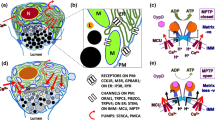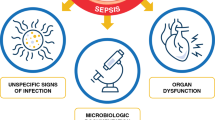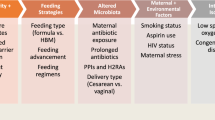Abstract
Purpose
Meconium peritonitis is caused by an intestinal perforation that may occur in the fetus, followed by severe chemical peritonitis, resulting in high morbidity.
Methods
We have experienced six patients with meconium peritonitis. Cystic drainage was performed soon after birth for all patients. We investigated the concentrations of several cytokines and a chemokine (interleukin 8) in the ascites from the six patients with meconium peritonitis. In two patients we also measured the serum cytokines and chemokine level just after birth.
Results
Interleukin 6 and interleukin 8 concentrations were very high in the cyst or ascites just after birth. In the serum taken from two patients, the levels of interleukin 6 and interleukin 8 were also high. In five patients who underwent drainage of cysts after birth, systemic inflammation could not be completely suppressed before curative surgery.
Conclusions
Interleukin 6 and interleukin 8 play important roles in the inflammatory response syndrome associated with meconium peritonitis, and drainage of cystic fluid did not completely suppress this inflammation. To lessen the high morbidity of meconium peritonitis, efforts should be made to suppress the inflammatory response using new treatment strategies, such as administration of steroids or anti-cytokine therapy to supplement cystic drainage.

Similar content being viewed by others
References
Gotsch F, Romero R, Kusanovic JP, et al. The fetal inflammatory response syndrome. Clin Obstet Gynecol. 2007;3:652–83.
Nam SH, Kim SC, Kim DY, et al. Experience with meconium peritonitis. J Pediatr Surg. 2007;42:1822–5.
Lally KP, Mehall JR, Thompson J. Meconium stimulates a proinflammatory response in peritoneal macrophages: implications for meconium peritonitis. J Pediatr Surg. 1999;34:214–7.
Osuchowski MF, Welch K, Siddiqui J, et al. Circulating cytokine/inhibitor profiles reshape the understanding of the SIRS/CARS continuum in sepsis and predict mortality. J Immunol. 2006;177:1967–74.
Ya-Xiong S, Lian-Chen S. Meconium peritonitis: observations in 115 cases and antenatal diagnosis. Z Kinderchir. 1982;37:2–5.
Tibboel D, Molenaar JC. Meconium peritonitis: a retrospective, prognostic analysis of 69 patients. Z Kinderchir. 1984;39:25–8.
Chan KL, Tang MHY, Tsu HY, et al. Meconium peritonitis: prenatal diagnosis, postnatal management and outcome. Prenat Diagn. 2005;25:676–82.
Wang CN, Chang SD, Wang TH, et al. Meconium peritonitis in utero: the value of prenatal diagnosis in determining neonatal outcome. Taiwan J Obstet Gynecol. 2008;47:391–6.
Kim SK, Romero R, Chaiworapongsa T, et al. Evidence of changes in the immunophenotype and metabolic characteristics (intracellular reactive oxygen radicles) of fetal, but not maternal, monocytes and granulocytes in the fetal inflammatory response syndrome. J Perinat Med. 2009;37:543–52.
Madsen-Bouterse SA, Romero R, Tarca AL, et al. The transcriptome of the fetal inflammatory response syndrome. Am J Reprod Immunol. 2010;63:73–92.
Salvesen B, Fung M, Saugstad OD, et al. Role of complement and CD 14 in meconium-induced cytokine formation. Pediatrics. 2008;121:e496–505.
Tanaka K, Hashizume K, Kawarasaki H, et al. Elective surgery for cystic meconium peritonitis: report of the two cases. J Pediatr Surg. 1993;28:960–1.
Citarelia BV, Miskolci V, Vancurova I, et al. Interleukin-10 versus dexamethasone: effects on polymorphonuclear leukocyte functions of the newborn. Pediatr Res. 2009;65:425–9.
Moreland LW. Cytokines as targets for anti-inflammatory agents. Ann N Y Acad Sci. 2009;1182:88–96.
Author information
Authors and Affiliations
Corresponding author
Rights and permissions
About this article
Cite this article
Kanamori, Y., Terawaki, K., Takayasu, H. et al. Interleukin 6 and interleukin 8 play important roles in systemic inflammatory response syndrome of meconium peritonitis. Surg Today 42, 431–434 (2012). https://doi.org/10.1007/s00595-011-0034-3
Received:
Accepted:
Published:
Issue Date:
DOI: https://doi.org/10.1007/s00595-011-0034-3




